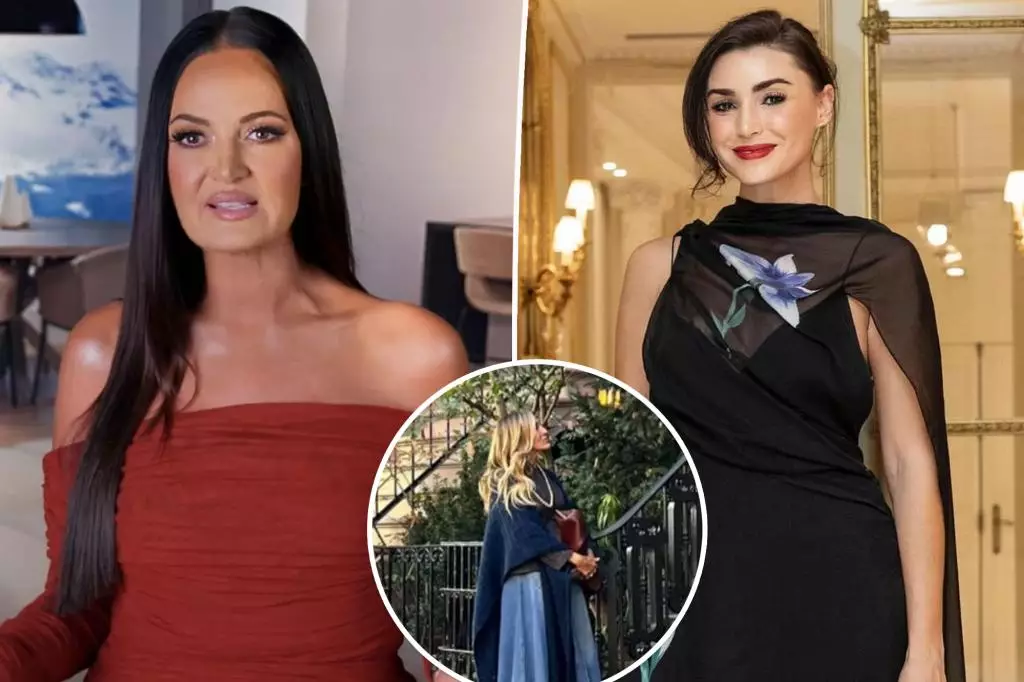The latest episode of “The Real Housewives of Salt Lake City” highlighted not only the glitzy lives of its cast but also the intense interpersonal dynamics that often spark conflict. At the center of this drama is Lisa Barlow, whose disdain for economy class travel ignites a heated exchange with fellow cast member Bronwyn Newport. Their confrontation serves as a microcosm of the larger themes of rivalry, loyalty, and the quest for status that permeate the reality television landscape.
The episode begins with the group heading to Palm Springs to celebrate Newport and her husband Todd Bradley’s anniversary. On the return flight, tensions surface, primarily due to Barlow’s discomfort with her seat assignment. Barlow’s remarks about New York-based fashion brand Coach and her aversion to what she perceives as lower-class accommodations reflect a more profound narrative about socio-economic divisions inherent in both reality TV culture and society at large. Barlow’s statement, “I don’t fly coach,” encapsulates her desire to project a lifestyle that is aspirational and unattainable for many viewers.
Barlow’s concerns about being the “last one to get off the plane” reveal an underlying fear of being associated with the stigma often attached to flying economy. The incident illuminates how travel choices can become broader symbols of one’s social status, suggesting that some cast members measure their worth and success through such trivial facets of life. In a reality show context, where every aspect is amplified for drama, Barlow’s reaction becomes not just a personal grievance, but a rich tapestry of elitism against the backdrop of luxury-seeking personas.
Social Media Wars and Backlash
The aftershocks of Barlow’s comments ripple through social media when Newport comes to Coach’s defense. Her strategic reference to Sarah Jessica Parker—a cultural icon synonymous with fashion from “Sex and the City”—aims to elevate the brand’s prestige while poking fun at Barlow’s stance. By posting an image of Parker with a Coach bag, Newport positions herself as both a defender of a well-established brand and a challenger of Barlow’s elitist tendencies. This exchange embodies how these women navigate personal grievances through public platforms, often seeking to bolster their positions by targeting the broader perception of brands and class.
Barlow herself becomes a victim of the backlash as fans share her derogatory remarks about Coach alongside Newport’s Instagram story. The involvement of Coach’s official account in the debate, with a simple “Oh!” comment, highlights how brands engage with pop culture narratives, turning personal spats into opportunities for visibility and engagement.
An already precarious friendship between Barlow and Newport takes a turn for the worse when the subject of Heather Gay’s exclusion from the trip surfaces. Barlow’s impulsive decision to FaceTime Gay while seated next to Newport breeds resentment, illustrating how loyalty can fracture in the spotlight. Newport’s subsequent frustration reveals the fragility of alliances in the reality TV sphere, where moments of tension are both fodder for drama and indicators of deeper social rifts.
Barlow’s recollection of the flight experience—feeling crammed and restricted, reminiscent of college days—becomes a metaphor for her emotional state within the group. Her grievances about seating arrangements mask deeper issues of trust and friendship loyalty that shimmer beneath the surface. Newport’s claim that Barlow’s actions felt more like an antagonistic move rather than genuine support points to an escalating narrative that could redefine relationships in subsequent episodes.
The episode is more than just an entertaining look at the lifestyles of the rich and famous; it’s an examination of how status, loyalty, and personal choices create an intricate web of relationships that can lead to both conflict and camaraderie. Lisa Barlow’s elitism clashes with Bronwyn Newport’s defense of a traditional brand, mimicking the tension that lies between aspiration and reality for many viewers. As the drama unfolds, it reflects the human condition’s complexities, all set against the glamorous but often contentious world of reality television. The allure of these shows lies in watching these dynamics play out, revealing lessons about societal norms and personal relationships that resonate far beyond the screen.

